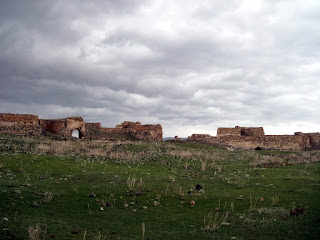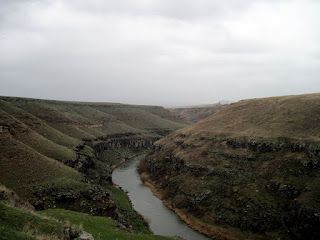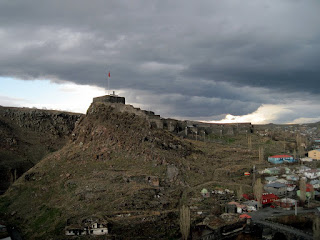On Sunday morning we got up early for our private tour of
Ani, which we had arranged by email before we arrived (and which
was confirmed at dinner the night before). Ani was the major reason that we chose to travel to this region, as it has only been opened to the public within the past 5-10 years and is really quite vast in scale and accessible for poking around. And we do like to poke.
We were joined by 3 others for the tour- 2 German women and a guy from New Zealand. We all took a 30 minute minibus ride to Ani, which is right at the border between Turkey and Armenia. As in Armenia is literally on the other side of the canyon that makes up the peninsula that is Ani, and we could see their flags (Russian and Armenian) and border guard outposts all throughout our tour. Celil narrated our drive with general history of the area, the local geography, the troubles with Armenia and Russia, etc. The rather unsavory history between Armenia and Turkey was definitely a reoccurring theme, and we definitely got a slightly one-sided take on the situation. On the way, we passed this strange monument to some massacre of Turkish people by Armenians. It was a little unclear to us that the claims made by this monument were actually true. I suppose that is really a major part of the problem in this conflict- there are lots of claims of wrongs that may or may not be entirely true and both sides have done some terrible things. At least that is my unprofessional assessment of the situation.


While we were at Ani, the weather was actually quite miserable. It was cold, windy and quite rainy at times, and all of that rain equaled lots of mud. Not that Ani wasn't still cool, but it is harder to grasp a camera through mittens. Celil was a very enthusiastic guide, although sometimes the combination of my ignorance on the history of the area and his Turkish English meant that I had no idea what was going on, but I figured I could use my guidebook to fill in the gaps. Sadly, Jessi and Brian currently have my Turkey guidebook, as they are continuing their travels in Turkey for another week, so please forgive me if my facts are rather sparse or incorrect.
Ani was a huge city built on a sort of penninsula; it is a triangle with deep river canyons on two sides and a huge double wall facing the plains. It was inhabited from the 900s to the 1700s, was a major stop on the Silk Road, and housed over 150,000 people at its largest. It was abandoned in the 1700s, rediscovered in the late 1800s, looted and damaged during WWI, and seems to have been mostly neglected since. Since it is so close to Armenia and is in the militarized border zone, tourists have only been allowed with special permits since the late 1990s or early 2000s, and photography has only been allowed since 2004 (did I mention that the relationship between Armenia and Turkey does not seem to be that great? and that the border is most definitely closed?). Ani is considered to be an endangered site, and I can see why. The protections that are in place are quite limited/ non-existent (for example, we were in a church with frescoes on the walls from the 1200s, and these men came in, took pictures with flashes, and then started smoking like chimneys), and it seems that little restoration work has been done. And they have resident cows and sheep to keep the grass from growing too tall so that they don't have a snake problem in the summer.
 |
| The walls are super thick! |
 |
| The main gate. |
 |
| Hello, cow friends. |
 |
| This church was struck by lightening and cut in half! |
 |
| View back towards the main gate. |
 |
| An oil press. Or hamam. |
 |
| Canyon separating Turkey and Armenia. |
The setting of Ani is really quite beautiful- mountains on horizon (Georgia to the North, Armenia to the East, Mt. Ararat to the South-ish), plains extending to the west and canyons surrounding the rest. The spring greens were really intense, probably thanks to the lovely rain that we were getting. The scope of Ani was really incredible- ruins and buildings for at least a kilometer each direction. We saw multiple churches, a mosque, a caravanseri (hotel for caravans), oil presses, hamams, houses, streets, a Zoarastrian temple, walls, bridges and cave villages in the distance.
 |
Mountains to the South.
|
 |
Ani is huge!
|
 |
| View towards Georgia. I think those hills in the distance are Georgia. |
 |
| View towards Armenia and a guard station. |
 |
| Cave village. |
We had a strange encounter in one of the churches, where we had retreated to admire the frescoes (from the 1200s!). Up until this point, we had been alone in Ani. Suddenly, a mass of about 40 Turkish men streamed into the church. And started taking pictures of us. Not the 800-year-old frescoes. Us. In fact, one man had a video camera stacked on top of his camera and was both videoing and snapping photos.
It gets better. The camera/video man then approached our tour guide and asked to interview Jessi, Brian and I for some local news. He made us trundle out in the rain to stand in front of the church (better light, I guess) and proceeded to interview us (with Celil serving as our translator). He wanted to know where we were from, how we liked Kars, how we heard about Ani, what we liked best there, etc. And then, as suddenly as all of the men had descended on us, they left. I'm not convinced that he was a legitimate reporter, but, either way, it was a rather strange experience.
 |
| Church with frescoes. |
 |
| Frescoes! |
 |
| Inside. |
 |
| There's a depiction of Palm Sunday! And it was Palm Sunday! |
Our tour of Ani was about 3 hours, and I was definitely chilled to the bone by the end. While I do enjoy ruins and things such as this, I have come to realize that I find real, live people so much more interesting.
 |
| Hamam. |
 |
| View towards the point of the peninsula. The part past the mosque is closed. |
 |
| The cathedral. |
 |
| Our tour group. |
 |
| Inside the cathedral. |
 |
| The cathedral was huge! |
 |
| Mosque. |
 |
| Residential street. |
 |
| Ani is ginormous! |
 |
| Another church. |
 |
| More cave villages. |
 |
| Ceiling in the Virgin's Chapel, possibly? |
 |
| Zoarastrian temple. A fire bowl was supported on the 4 big pillars. |
 |
| Heading out. |
 |
| Brian, Jessi and I at the main gate. |
 |
| Ani from the front. |

On the way back to Kars, we questions Celil about the "bizarre" monument above Kars, and we got a pretty interesting story. Apparently, the mayor decided to build a monument and chose whatever location he liked, despite the presence of historical sites in the area. Locals attempted to stop it, but the mayor got someone to say that there was no problem with building in the area and just went ahead with his project. He got a famous artist to design the sculpture, but then the builders ended up being incompetent (possibly corruption involved) and made the heads too big. So they had to make new heads. Then the hand was too big, so they had to make a new one. At this point, a new mayor was elected, and a lawsuit to remove the statue (due to the underlying historical sites) succeeded. The artist apparently raised a stink, and Western news outlets grabbed the story and spun it as though the statue was going to be torn down because the government were Islamic extremists. Which leaves a bizarre statue built on top of historical artifacts with several random over-sized appendages hanging out on a hill above Kars. I thought this was so interesting! A little view into life in Kars...
Back in Kars, we had a delicious home-cooked meal at a small restaurant that Celil recommended to us. Once properly fed and warmed, we tackled the rest of our Kars to-do list: the Kars museum and seeing the bizarre statue and its appendages in person.
 |
| On the way to the museum. |
The Kars museum was slightly underwhelming, although the cultural information on the weaving of messages into local traditional weaving was entertaining. (Apparently embroidering chili peppers on your husband's hat meant that he was in BIG trouble!) The most interesting item was a train car located in the yard that turned out to be where the treaty was signed that created Armenia. Quite a large event for a train car, I'd say.
After a trek along the wrong side of Kars in which we were followed by about 10 kids and watched garbage being bulldozed into the river, we made it to the monument. There were quite a few men there that we seemed to be disturbing, but they evacuated and let us poke around. After seeing the statue, we walked around a building under the monument, and the men started tearing apart the building right above where we had just been standing. We decided it was time to go.
 |
| Kars. |
 |
| Statue. And random hand! |
 |
| Why yes, this is a very large hand. |
 |
| And large heads. |
 |
| The faulty hand mold, possibly? |
 |
| Kars Castle on the opposite hill. |
 |
| The building before men started tearing it up even more. |
We ended up spending the rest of the evening in the hotel room, as we a) had a large lunch and weren't hungry, b) didn't have the energy to be stared at and followed any more, and c) had pretty much exhausted the store of things to do in Kars. Plus, our trek to Iraq started the next day! Excitement!



























































































2 comments:
It sounds like quite a day! the statue story is quite fascinating.
I love all the photos, Sarah! It sounds like a day to remember! :)
Post a Comment